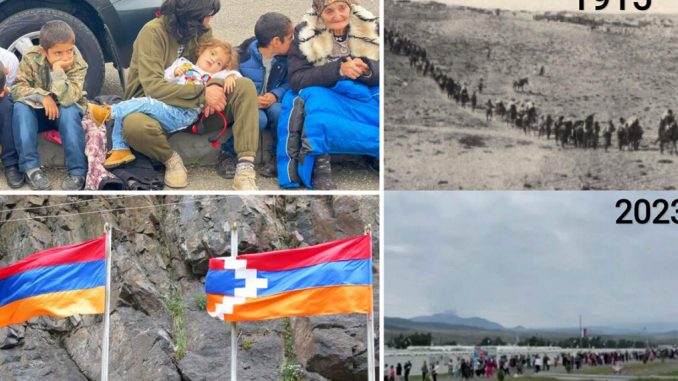
On Tuesday, September 19, 2023, Azerbaijan began the bombardment of Stepanakert the capital of Armenian Nagorno-Karabakh (Artsakh). 27 people were killed; 138 people injured. Within two days, Artsakh surrendered to Azerbaijan. Artsakh authorities said they had no alternative. Nagorno-Karabagh is on its knees after a nine-month blockade of the Lachin Corridor, the only road connecting it to Armenia. Before the blockade, 90% of Artsakh’s food was imported from Armenia.
In February 2023, the International Court of Justice ordered Azerbaijan to open the Lachin Corridor. Instead, Azerbaijan installed a security checkpoint, sealing off the “Road of Life.” Artsakh has run out of flour to make bread. Hospitals are out of medicines. Stores have no baby formula. Artsakh’s dialysis units have shut down. One in three deaths is due to malnutrition. Former prosecutor for the International Criminal Court, Luis Moreno Ocampo, says Azerbaijan is using starvation as a strategy to commit a silent genocide. Acts of genocide include not just mass killing. They include “deliberately inflicting on the group conditions of life calculated to bring about its physical destruction in whole or in part.” (Genocide Convention Article 2(c))
Azerbaijani President Aliyev’s dictatorial regime’s objective is to drive all Armenians out of Artsakh through war and genocide. Aliyev wants full integration of Artsakh into Azerbaijan.
Armenians and many other scientists, politicians etc. claim integration will lead to genocide, repeating past Baku and Sumgait pogroms.
Aliyev’s genocidal intent is often expressed in his dehumanization of Armenians. The silent genocide has become overt. Azerbaijan has mobilized its military along the borders of Artsakh and Armenia since early September, 2023. All-out war would mean another Armenian Genocide. With no reliable allies, Armenian defeat was certain. To save lives, surrender was the only option.